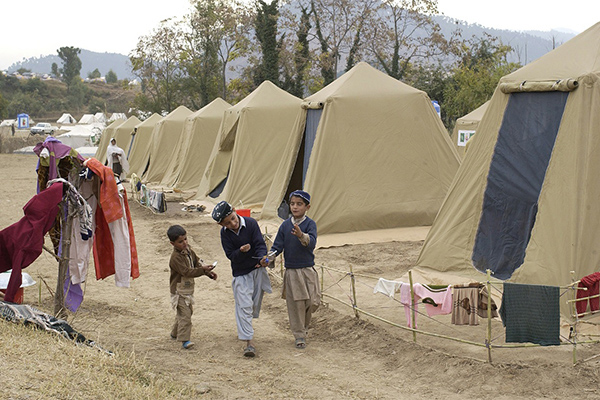Migration, immigration and refugees today
By Linda B. Glaser

Migration is one of the major forces shaping the world today, with more than 60 million displaced people.
“Never in history have we seen this many simultaneous displacements across the globe, and these people are not going home any time soon,” says Mostafa Minawi, assistant professor of history and the A. Himan Brown Sesquicentennial Faculty Fellow. “This is a global population redistribution, and it will hit us whether we like it or not.”
Although migration has always been a factor in world history, now war, civil unrest, economic dislocation and climate change are combining to create what some policymakers call “disposable” populations. “It’s in our interest to study migration, to ask, what are the policies that are uprooting populations?” says Maria Cristina Garcia, the Howard A. Newman Professor of American Studies. “What are the consequences for those who are uprooted as well as for the host societies who are then going to have to accommodate them?”
Syrian refugees are currently attracting a great deal of attention as a visible by-product of regional power struggles and a reminder to Americans of the threat ISIS terrorism poses, but Garcia emphasizes the importance of remembering there are also migrant crises in Eritrea, Burundi, Libya and elsewhere.
“Students enroll in immigration courses because they are troubled by what they read in the news. They want to understand who’s migrating to the U.S., and what the appropriate response should be to that migration,” says Garcia. “They think the anti-immigrant discourses are unique to their day. But when they study history, when they examine migration and policy over a longer period of time, they see patterns emerge. History, and the humanities in general, remind us to look for those patterns, to look for the similarities and the disjunctures, to see what conclusions we might reach.”
Says Leslie Adelson, the Jacob Gould Schurman Professor of German Studies: “Quantitative science looks at large numbers of people, what factors push lots of people to places and what factors pull them to a place. For example, Germany now has big pull factors, and Syria has big push factors. What humanists bring are the heightened attention to blind spots in categories we use in analysis and a heightened attention to how perceptions are formed and how they can be changed in productive and creative ways. Not just creating empathy for migrants, but acknowledging existing bonds for and among migrants, and forging new bonds.”
On April 12, the College of Arts and Sciences brought together faculty working on migration in a Big Ideas panel, part of the New Century for the Humanities celebration. The event was held in the Groos Family Atrium in Klarman Hall and featured Garcia, Iftikhar Dadi, MA ’01, Ph.D. ’03, associate professor of history of art, and Alejandro Madrid, associate professor of music.
Dadi’s presentation explored his latest book, on Anwar Jalal Shemza, an immigrant to Britain from the colonial territory that became Pakistan. Dadi traced the impact of Shemza’s migration on his work and his identity, including an existential crisis when he destroyed all his artwork, writing, “The search was for my own identity. Who was I? … I had lost my home. I was an exile, homeless, without a name.”
In his talk, “The Intersection of Migration, Sound and Music in 21st-Century U.S.,” Madrid addressed migration anxieties being expressed in contemporary political rhetoric, and how sound and music intersect these issues. Donald Trump’s characterization of Mexican immigrants as rapists and drug dealers, said Madrid, “are a political response to what we now understand are the main anxieties that fuel his campaign, a widespread idea among a white sector of the electorate that immigration is changing the United States, making them lose the invisible upper hand that their race-based privilege had bestowed on them for generations.”
In her presentation, Garcia pointed out the number of displaced persons in the world requires an emphasis on burden sharing and multilateral responses. “We can’t work unilaterally to address ‘disposable’ populations in the world,” she said. “Americans can’t ignore these challenges and hope problems will go away. We are part of the international community.”
Linda B. Glaser is a staff writer for the College of Arts and Sciences.
Media Contact
Get Cornell news delivered right to your inbox.
Subscribe